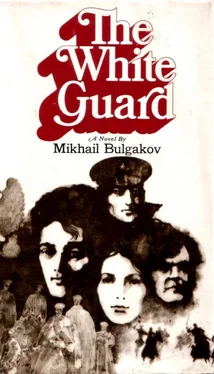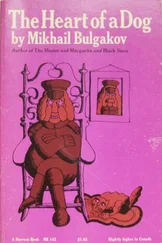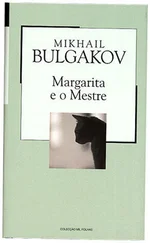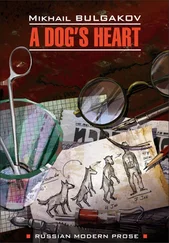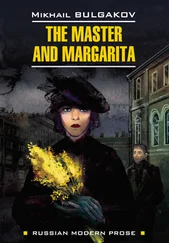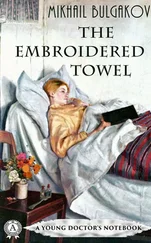MIKHAIL BULGAKOV - THE WHITE GUARD
Здесь есть возможность читать онлайн «MIKHAIL BULGAKOV - THE WHITE GUARD» весь текст электронной книги совершенно бесплатно (целиком полную версию без сокращений). В некоторых случаях можно слушать аудио, скачать через торрент в формате fb2 и присутствует краткое содержание. Жанр: Русская классическая проза, на английском языке. Описание произведения, (предисловие) а так же отзывы посетителей доступны на портале библиотеки ЛибКат.
- Название:THE WHITE GUARD
- Автор:
- Жанр:
- Год:неизвестен
- ISBN:нет данных
- Рейтинг книги:3 / 5. Голосов: 1
-
Избранное:Добавить в избранное
- Отзывы:
-
Ваша оценка:
- 60
- 1
- 2
- 3
- 4
- 5
THE WHITE GUARD: краткое содержание, описание и аннотация
Предлагаем к чтению аннотацию, описание, краткое содержание или предисловие (зависит от того, что написал сам автор книги «THE WHITE GUARD»). Если вы не нашли необходимую информацию о книге — напишите в комментариях, мы постараемся отыскать её.
Copyright © 1971 by McGraw-Hill Book Company.
Library of Congress Catalogue Card Number: 70-140252 08844
Printed in Great Britain
THE WHITE GUARD — читать онлайн бесплатно полную книгу (весь текст) целиком
Ниже представлен текст книги, разбитый по страницам. Система сохранения места последней прочитанной страницы, позволяет с удобством читать онлайн бесплатно книгу «THE WHITE GUARD», без необходимости каждый раз заново искать на чём Вы остановились. Поставьте закладку, и сможете в любой момент перейти на страницу, на которой закончили чтение.
Интервал:
Закладка:
'Petlyura is an adventurer, who threatens the country with destruction from his comic-opera regime . . .'
'You must understand, Elena, that I can't take the risk of having to go into hiding and facing the uncertainties of the immediate future here. Don't you agree?'
Elena said nothing in reply, being a woman of pride.
'I think,' Talberg went on, 'that I shall have no difficulty in getting through to the Don by way of Roumania and the Crimea.
Von Bussow has promised me his co-operation. They appreciate me. However, the German occupation has deteriorated into a comic opera. The Germans are leaving. (Whisper) By my calcula-tions Petlyura will collapse soon, too. The real power is in the South - Denikin. You realise, of course, that I can't afford not to be there when the army of the forces of law and order is being forned. Not to be there would ruin my career - especially as Denikin used to be my divisional commander. I'm convinced that in three months' time - well, by May at the latest - we shall be back in the City. Don't be afraid. No one is going to touch you and in a real emergency you still have your passport in your maiden name. I shall ask Alexei to make sure that no possible harm comes to you.'
Elena looked up with a jerk.
'Just a moment,' she said, 'shouldn't we tell Alexei and Nikolka at once that the Germans are betraying us?'
Talberg blushed deeply.
'Of course, of course, I will certainly . . . On second thoughts, you had better tell them yourself. Although it makes very little real difference to the situation.'
For an instant Elena had a strange feeling, but she had no time to reflect on it. Talberg was kissing her and there was a moment when his two-layered eyes showed only a single emotion -tenderness. Elena could not prevent herself from bursting into tears, although she cried silently. She was, after all, her mother's daughter and a strong woman. Then came Talberg's leave-taking with her brothers in the living-room. A pinkish light shone from the bronze lampstand, flooding the corner of the room. The piano bared its familiar white teeth and the score of Faust lay open at the passage where the flamboyant lines of notes weave across the stave in thick black clusters and the gaily-costumed, bearded Valentine sings:
'I beg you, beg you for my sister's sake, Have mercy on her - mercy! Guard her well, I pray you.'
At that moment even Talberg, who had never been a prey to sentimental feelings, recalled the dense black chords and the tattered pages of the age-old family copy of Faust. Never again would Talberg hear the cavatina 'Oh God Almighty', never again hear Elena accompanying Shervinsky as he sang. But long after the Turbins and Talbergs have departed this life the keys will ring out again and Valentine will step up to the footlights, the aroma of perfume will waft from the boxes and at home beautiful women under the lamplight will play the music, because Faust, like the Shipwright of Saardam, is quite immortal.
Talberg stood beside the piano as he said his piece. The brothers listened in polite silence, trying not to raise their eyebrows - the younger from pride, the elder from lack of courage. Talberg's voice shook.
'You will look after Elena, won't you?' The upper layer of Talberg's eyes looked at them anxiously, pleadingly. He stuttered, glanced awkwardly at his pocket watch and said nervously: 'It's time to go.'
Elena embraced her husband, hastily made a fumbling sign of the cross over him and kissed him. Talberg brushed his brothers-in-law on the cheek with his clipped, bristly moustache. With a nervous glance through his wallet he checked the thick bundle of documents in it, re-counted the thinner wad of Ukrainian money and German marks; then smiling tensely he turned and went. The light went on in the lobby, there came the sound of his trunk bumping downstairs. Leaning over the banisters, the last thing that Elena saw was the sharp peak of his hood.
At one o'clock in the morning an armored train like a gray toad pulled out from Track 5, through the dark graveyards of rows of idle, empty freight cars, snorting and picking up speed as it spat hot sparks from its ash-pit and hooted like a wild beast. Covering six miles in seven minutes it reached Post-Volynsk with a roar and a rattle and a flash of its lights, arousing a vague sense of hope and pride in the cadets and officers huddled in railroad cars or on guard duty. Without slowing down the armored train was switched off the main line and headed boldly away towards the German frontier. After it, ten minutes later, a passenger train with a colossal locomotive and dozens of brilliantly-lit windows passed through Post-Volynsk. Massive as obelisks and swathed to the eyes, German sentries flashed by on the platforms at the end of the cars, their black bayonets glinting. Hunched up from the cold and lit by rapid shafts of light from the windows, the switchmen watched as the long pullman cars rattled over the junction. Then everything vanished and the cadets were seized with envy, resentment and alarm.
'Ah, the swine . . .' a voice groaned from the switches as the blistering gust of a snowstorm lashed the railroad cars housing the cadets. That night Post was snowed up.
In the third car back from the locomotive, in a compartment upholstered in checkered calico, smiling politely and ingratiatingly, Talberg sat opposite a German lieutenant and spoke German.
'Oh, ja', drawled the fat lieutenant from time to time and chewed his cigar.
When the lieutenant had fallen asleep, when all the compartment doors were shut and all that could be heard in the warm, brilliantly lit car was the monotonous click of the wheels, Talberg went out into the corridor, opened one of the pale-colored blinds with their transparent letters 'S. - W.R.R.' and stared long into the darkness. Occasional sparks, snow flickered past, and in front the locomotive raced on and with a howl that was so sinister, so threatening that even Talberg was unpleasantly affected by it.
Three
In the downstairs apartment at No. 13, which belonged to Vasily Lisovich, engineer and householder, absolute silence reigned at that hour of the night, a silence only occasionally dis-turbed by a mouse in the dining-room. Busily and insistently the mouse gnawed and gnawed away at an old rind of cheese, cursing the meanness of the engineer's wife, Wanda Mikhailovna. The object of this abuse, the bony and jealous Wanda, was sound asleep in the dark bedroom of their damp, chilly apartment. Lisovich himself was still awake and ensconced in his study, a draped, book-lined, over-furnished and consequently extremely cosy little room. The standard lamp, in the shape of an Egyptian queen and shaded in green flowered material, lit the room with a gentle mysterious glow; there was something mysterious, too, about the engineer himself in his deep leather armchair. The mystery and ambiguity of those uncertain times was expressed above all in the fact that the man in the armchair was not Vasily Lisovich at all, but Vasilisa ... He, of course, called himself Lisovich, many of the people he met called him Vasily, but only to his face. Behind his back no one ever called him anything but Vasilisa. This had come about because since January 1918, when the strangest things began happening in the City, the owner of No. 13 altered his distinctive signature, and from a vague fear of committing himself to some document that might be held against him in the future, instead of a bold 'V. Lisovich' he began signing his name on questionnaires, forms, certificates, orders and ration cards as 'Vas. Lis.'
On January 18th 1918, with a sugar ration card signed by Vasily Lisovich, instead of sugar Nikolka had received a terrible blow on his back from a stone on the Kreshchatik and had spat blood for two days. (A shell had burst right over the heads of some brave people standing in line for sugar.) When he reached home, clutching the wall and turning green, Nikolka had managed to smile so as not to alarm Elena. Then he had spat out a bowlful of blood and when Elena shrieked: 'God - what's happened to you?' he replied: 'It's Vasilisa's sugar, damn him!' After that he turned white and collapsed. Nikolka was out of bed again two days later, but Vasily Lisovich had ceased to exist. At first only the people living at No. 13, then soon the whole City began calling him Vasilisa, until the only person who introduced him as Lisovich was the bearer of that girl's name himself.
Читать дальшеИнтервал:
Закладка:
Похожие книги на «THE WHITE GUARD»
Представляем Вашему вниманию похожие книги на «THE WHITE GUARD» списком для выбора. Мы отобрали схожую по названию и смыслу литературу в надежде предоставить читателям больше вариантов отыскать новые, интересные, ещё непрочитанные произведения.
Обсуждение, отзывы о книге «THE WHITE GUARD» и просто собственные мнения читателей. Оставьте ваши комментарии, напишите, что Вы думаете о произведении, его смысле или главных героях. Укажите что конкретно понравилось, а что нет, и почему Вы так считаете.
